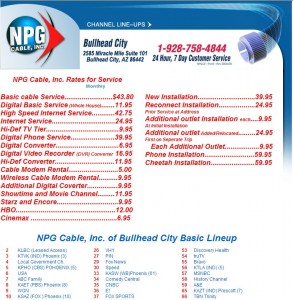 Stop the Cap! has obtained new evidence outlining the scheduled implementation of Frontier’s new usage cap, its rationale, and how the company intends to convince customers that a usage cap is right for them.
Stop the Cap! has obtained new evidence outlining the scheduled implementation of Frontier’s new usage cap, its rationale, and how the company intends to convince customers that a usage cap is right for them.
New documents made available exclusively to Stop the Cap! show a company relying on highly questionable, possibly manipulated data to argue for usage caps, at a time when many cap opponents have accused the broadband industry of fixing the facts around the narrative of a need for metered Internet service. The documents also raise new questions about whether company officials are using actual Frontier usage data, which we easily obtained from our own sources, or if they are simply telling a different version of reality to their employees.
The Implementation Plan
Despite the representations by Frontier customer service made to several readers of Stop the Cap!, there definitely is a 5GB usage cap, as published on the company’s website. However, sources tell us the wording of the usage cap announcement may not have been completely vetted by company officials, and its appearance may have been premature. The company has started to tweak the language on the page, perhaps in response to the predictable backlash, now adding language to tell customers they will not be charged any overuse fees or face service interruption if they exceed the cap at this time.
Company officials are following a careful plan, the details of which we have obtained, to roll out the usage cap in Frontier service areas, starting with notification of the “problem of bandwidth usage” in a newsletter to be mailed to customers in September, stating Frontier’s position on the problems of bandwidth consumption and inviting a dialogue on the issue.
Company officials will also continue to use the same flawed statistics published on their website to give customers a measure of what 5GB of usage constitutes. No independent evidence backing up their claim of a bandwidth consumption problem, or the actual impact on Frontier’s network, or their resulting costs, will be provided to consumers.
With the ultimate outcome already pre-determined by company officials, the implementation of a 5GB cap is already underway across all of their residential DSL product lines (which vary according to speed provided). Company officials will also conduct focus group testing and further marketing research in an effort to determine how to market the new service limitations, and convince customers that a 5GB monthly cap is a reasonable and fair solution.
The company will also announce bandwidth measurement tools available to subscribers starting in 2009, so they can monitor just how rapidly they will exceed Frontier’s usage caps.
Customers exceeding 5GB per month will eventually be offered an option to consume more bandwidth at yet-to-be-determined rates, but there are questions as to whether an unlimited consumption plan will ever be available from Frontier.
The rationale for the cap, outlined in different documents supplied to Stop the Cap!, varies according to who the document’s audience is. Customer service personnel are being told the usage cap is a result of excessive bandwidth consumption. But another document emphasizes the increased revenue potential a capped DSL product provides.
This raises new questions about whether the usage cap is truly intended to be a reasonable solution to their claims of a “broadband crisis,” or a financial rescue plan to enhance profits and offset substantial losses from their other divisions, particularly traditional telephone service. Company officials draw direct lines between the growing returns available from broadband services and how that revenue has become increasingly important to company profits as well as shareholder value and return in a difficult economic environment.
It’s a win-win for any company that can successfully increase profits, decrease investment in infrastructure, and convince customers that the resulting dramatic reduction in service represents a positive change.
“The average customer uses less than 1.5GB per month”

Frontier's Idea of Dialogue With Customers: "You Give Us Your Money & We Promise To Give You Less Service."
Remarkably, Frontier has told employees that the average customer uses less than 1.5GB of usage per month. But Stop the Cap! has seen company data which suggests otherwise, and that raises questions as to whether company management is really aware of the actual usage profile of their customers, or if they are simply not disclosing the facts to employees now forced to defend their 5GB “solution.”
For instance, we have noted that in just one division, Elk Grove, California, more than 40% of customers already well-exceed 5GB of usage per month, often consuming more than 20GB of usage. In other divisions, the numbers tell a story wildly different from what Frontier management is telling their employees.
We’ve also seen figures that illustrate the myth of the “bandwidth hog.” While every division has stories of a handful of heavy users obviously running a torrent client or server 24 hours a day, which can consume hundreds of gigabytes of usage over a month, there is absolutely no evidence those users represent a growing percentage of Frontier’s customers. Additionally, Frontier’s existing acceptable use policies already provide avenues for the company to address those engaged in prohibited activities without punishing their entire customer base.
In fact, the company’s own research shows broadband usage growth increasing, but at a largely even rate, as customers begin to take advantage of new broadband-tailored services, such as streaming video.
It’s also notable Frontier has a partnership with Netflix to provide new customers with the benefits of a Netflix membership when signing up to a Frontier product bundle. Ironically, Netflix is launching a new service to deliver video content to subscribers who use a home terminal sold by the company that connects to their broadband service. Frontier customers attempting to use the service will exceed their usage cap just using the service a few times per month.
The overall Internet bandwidth growth pattern is comparable across many providers, and is not out of line with historical averages. To be sure, the Internet is rapidly growing, but so are the resources to manage that growth. Many costs, such as bandwidth, are actually declining, particularly for the industry’s largest players on a “per-gigabyte” basis.
Maggie Wilderotter, CEO of Frontier Communications, uses numbers that simply don’t add up:
Broadband usage consumption at Frontier in on track to increase by 100% year over year. It is important to note that close to 80% of our customers will NOT REACH the 5 Gb cap for several years.
Let’s do the math. Using their own figures, which are disputed by their own internal numbers, let’s discover what “several years” equals in Frontier time:
Frontier’s Predicted Usage Trend
January 1, 2008 Customer utilizes 1.5GB usage
January 1, 2009 Customer utilizes 3GB usage
January 1, 2010 Customer utilizes 6GB usage
If you are a Frontier DSL customer in western New York, even relying on their numbers disclosed to employees, by the time you are finished raking your leaves in the fall of 2010, you will already be considered a “bandwidth hog” by Frontier, subject to overuse penalties.
We’re Doing This Because They’re Doing It
Prominent among Frontier’s reasons for implementing a bandwidth usage cap is that other companies are doing it. As Stop the Cap! has observed, the lack of competition in many areas has allowed a duopoly of broadband providers to emerge, easily allowing for both companies to mirror rate increases and restrictions without fear of mass subscriber defection.
Frontier also complains it is forced to invest millions of dollars in their network and infrastructure as a result of Internet growth. Their latest 10-Q SEC filing suggest a lower amount, but regardless, these kinds of investments have always been a factor in broadband services. Independent research of bandwidth usage illustrate the trends are completely in line with well-predicted trends made several years ago without panic from bandwidth providers, and many of these costs also come from broadband subscriber growth, which Frontier itself trumpets as a success in its messages to employees.
The challenge Frontier faces is that it remains a small player in a narrowing field of large national providers. Larger companies with more resources enjoy greater economy of scale in both equipment and bandwidth costs, and the ability to leverage multiple services (video, telephone, and very high speed data) over a high capacity fiber optic or hybrid fiber/coaxial network. Those stuck with aging copper wire on telephone poles are at an immediate disadvantage.
Frontier recognizes these challenges, and has managed to find the financial resources to continue acquiring additional companies to incorporate into its portfolio, most recently including Commonwealth Telephone Enterprises, Inc. ($1.1 billion), Global Valley Networks, Inc. and GVN Services through a purchase from Country Road Communications, LLC ($62 million). It’s also attempting to build its own fiber-to-the-home network in limited areas, typically in new housing developments or apartment buildings.
As Stop the Cap! will reveal in an exclusive report later this week, Frontier and other traditional wireline telephone companies are rapidly losing revenue from traditional telephone subscribers as they disconnect service, relying on their wireless phone or competing voice over IP telephone services. Broadband remains a shining beacon in a sea of economic challenges the traditional telephone company industry faces. The push for profitability of this successful product line is becoming more critical than ever. Limiting subscriber use enhances those profits.
Run The Clock Out On The Contract Customer
Frontier’s customer service representatives have been told to resist efforts by consumers with term contracts with the company to pursue their right to terminate service without incurring any early termination fees. We have learned that customer service representatives have been instructed to tell customers trapped in multi-year DSL contracts that Frontier is not currently enforcing a usage cap, so there is nothing for them to opt-out from.
But as Stop the Cap! has already reported, customers under contract have the right to exit that contract if the company unilaterally attempts to change the terms. Frontier’s own marketing tells customers a “price protection agreement,” a feature of a term contract, protects them from price increases for the balance of the contract. But with a 5GB usage cap, those exceeding the cap face significant penalties or overage fees for doing so beginning as early as next year. Where’s the price protection?
Through an opt-out procedure the company includes in its terms and conditions, customers have 30 days to notify the company it does not accept the material change a 5GB usage cap represents to their contract. After 30 days, continued use of the service constitutes acceptance of the new terms going forward under an existing contract.
Until Frontier guarantees in writing that a customer under contract will be exempted from any usage cap or corresponding overage fees for the balance of their contract, we continue to recommend the consumer cancel their contracts within the 30 day window that opened on July 23, 2008 when the company first published a notice to customers of the 5GB usage cap.
“We want to establish a dialogue with customers.” OK, Here’s What We Have To Say
Although the company claims to want to take the time to engage in a dialogue with customers, their actions thus far have largely been in one direction. In the material we were able to review, it’s clear the company has already determined exactly what steps it plans to take and has a timeline for doing so. The only thing left is the focus group and market research to try and find a way to sell their customers on their plans and do damage control.
Stop the Cap! continues to urge Frontier, a secondary competitor in many markets, to reconsider their plans to implement this usage cap. In addition to cannibalizing your own customer base, who will flee in greater numbers to competitors as consumers become educated about the impact of such caps, this kind of usage capped service at current pricing attracts regulatory review of the current state of broadband service in this country.
More importantly, this may well represent the biggest missed opportunity to deliver a marketing win for Frontier in the history of the company. DSL has managed to survive against cable competition because it is willing to compete on price, even if it cannot always match the speeds that cable and fiber optic platforms can deliver. To survive in this marketplace, being willing to deliver that lower price and more flexibility is the only way DSL can ultimately succeed in areas where a faster competitor is available.
A 5GB capped DSL service in metro Rochester against Road Runner guarantees the end of Frontier DSL as a meaningful player in that market, especially if Time-Warner capitalizes on the cap in their marketing, which is likely. In areas where Verizon FiOS is rolling out service, Frontier employees should be updating their resumes and start looking for work elsewhere. Your career path at Frontier ends where Verizon’s unlimited, extremely fast, and competitively priced fiber optic broadband network begins.
It’s not too late to make the right choice and plug into the reality of today’s broadband marketplace. That’s our dialogue to you, with the sincere hope Frontier executives will pick up what we’re putting down before the last customer out the door switches off the lights.
Coming Up Tomorrow: How Frontier Competes With Time-Warner & Other Providers
Friday: Frontier’s Losses Accelerate in The Phone Line Business
And next week: Undoing the Damage; Becoming a More Effective Competitor & Customer Reaction to Frontier’s Bandwidth Cap Plans
 Business is hardly booming in the traditional wired telephone line business these days, and Frontier Communications is no exception to that trend. Internal documents obtained by Stop the Cap! illustrate that companies like Frontier are becoming more dependent than ever on data products and services to make up the difference.
Business is hardly booming in the traditional wired telephone line business these days, and Frontier Communications is no exception to that trend. Internal documents obtained by Stop the Cap! illustrate that companies like Frontier are becoming more dependent than ever on data products and services to make up the difference.


 Subscribe
Subscribe




